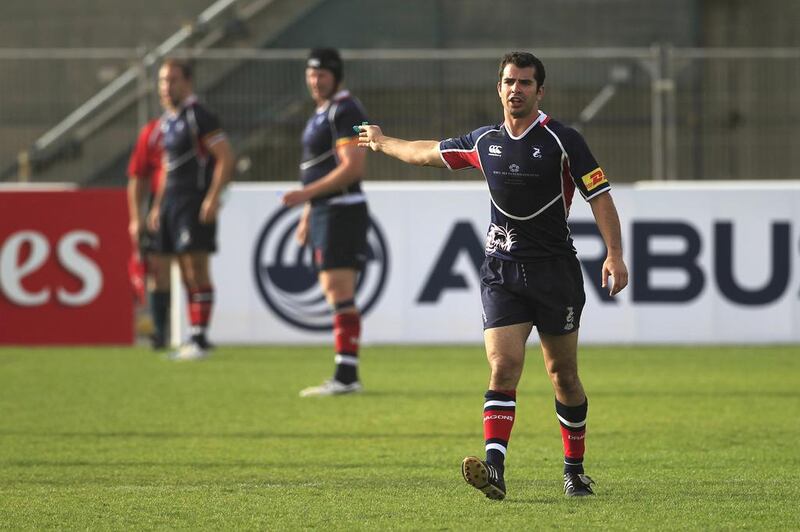Dubai // The first Arab national to captain the representative side from this region has been forced to retire from rugby union due to the effects of multiple concussions.
Taif Al Delamie, who led the Arabian Gulf in the Asian Five Nations Division 1 in 2009, has been advised to give up the game by doctors because of head trauma.
The Omani centre, who also captained Jebel Ali Dragons to a treble of club trophies two seasons ago, will retire with immediate effect, age 28.
Having felt lasting effects of previous head injuries, he has met with doctors and neurologists since the domestic season ended, and was given the same opinion by each.
“Based on 10 previous concussions and the fact I’ve still been feeling some symptoms, they strongly advised me to stop contact sports,” Al Delamie said.
The amiable back was a central part of the Gulf side when the international game was at its zenith in this country, as part of the 2009 World Cup Sevens played on home soil.
RELATED:
[ — UAE will bid for 2021 rugby league World Cup ]
[ — UAE rugby making progress with help from Steve Thompson and Apollo Perelini ]
[ — UAE national rugby team training in Dubai — in pictures ]
He ranks that tournament as the finest memory he will take away from the sport.
“By far the best experience for me was getting to represent the Arabian Gulf at sevens and run out on that main pitch against New Zealand and South Africa,” he said.
“Scoring tries against world champions Samoa on the international stage, and being in the tunnel before you are about to run out on the main pitch against the All Blacks, I will never forget that.
“Domestically, winning the treble as captain of the Dragons was definitely my highlight.”
Al Delamie was based in Ireland, where he grew up, when he was picked to play for the Gulf at the 2009 World Cup Sevens in Dubai.
When the Gulf union was disbanded at the end of 2010 and replaced in Asian competition by the newly formed UAE side, he was ruled ineligible.
However, he relocated to the UAE, partly with a view to qualifying after three years as a resident as he was so intent on playing international rugby again.
He became eligible for the national team this season, and started training with the extended squad aiming for selection for May’s tour to Malaysia, before the decision was made to stop playing.
Ironically, one of Al Delamie’s closest friends from the 2009 World Cup squad, Jonny Macdonald, another outstanding young player, has also seen his playing career ended by concussion.
According to Murray Strang, a teammate and, for the past season, coach of Al Delamie at the Dragons, rugby in the region is losing one of its most affable personalities and star players.
“He has been an absolute leading light,” said Strang, who hopes the Dragons can retain Al Delamie’s expertise in a fitness training capacity.
“He has been a model of consistency, attendance, fitness, as well as being such a personable and good bloke.
“It is such a loss, not just for Dragons but, it wouldn’t be an exaggeration to say, for rugby across the region as well. Everybody recognises him.”
Al Delamie suffered a serious head injury in the opening game of last season, against Xodus Wasps Dubai, was carried off on a stretcher and taken to hospital in an ambulance.
He was advised to take an extended break from playing, and when he did return he wore a scrum-cap during matches for the first time.
However, he has been knocked out on many other occasions in his career, too, and medical advice suggests the toll has been too great for him to play on.
“I was fearing it, especially after the last one, against Wasps, because that was the worst I’ve had in my whole career,” Al Delamie said.
“I said if one was to happen again, that would be it, I would hang up my boots. I got through the rest of the season, but since then have been having some dizzy spells which are associated with concussion.
“When you are feeling like that, it is not a tough decision to make. When you are feeling good, that is when you think what you potentially could be doing and what you are missing out on. I really haven’t come to terms with it at all.”
FOLLOW US ON TWITTER @NatSportUAE






